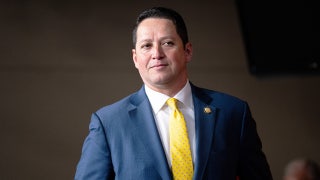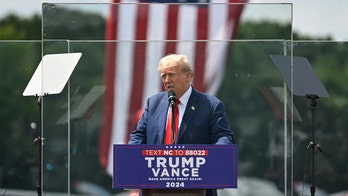California has long been known for its push toward more progressive policies, many of which now form the basis of the Joe Biden-Kamala Harris presidential ticket. But whether or not such proposals have been successful – and whether California should be lauded as a model -- is subject to intense debate.
The notion that California serves as an appropriate template for the federal policy has both its backers and its critics, with the latter pointing to its massive debt – at just below $290 billion, as per the World Population Review Data – making it the fifth highest in the U.S., behind New Jersey, Illinois, Massachusetts, and Kentucky.
An article authored by political reporters for CalMatters – a Sacramento-based, nonprofit journalism venture focused on issues related to environmental regulation, education, health care, criminal justice, and economic inequality – says "many of the major policies that former Vice President Joe Biden is proposing are already in place in California to some degree."
So what are some of the Biden-Harris campaign strategies – Harris is a California native and U.S. senator – have already set in motion inside the Golden State?
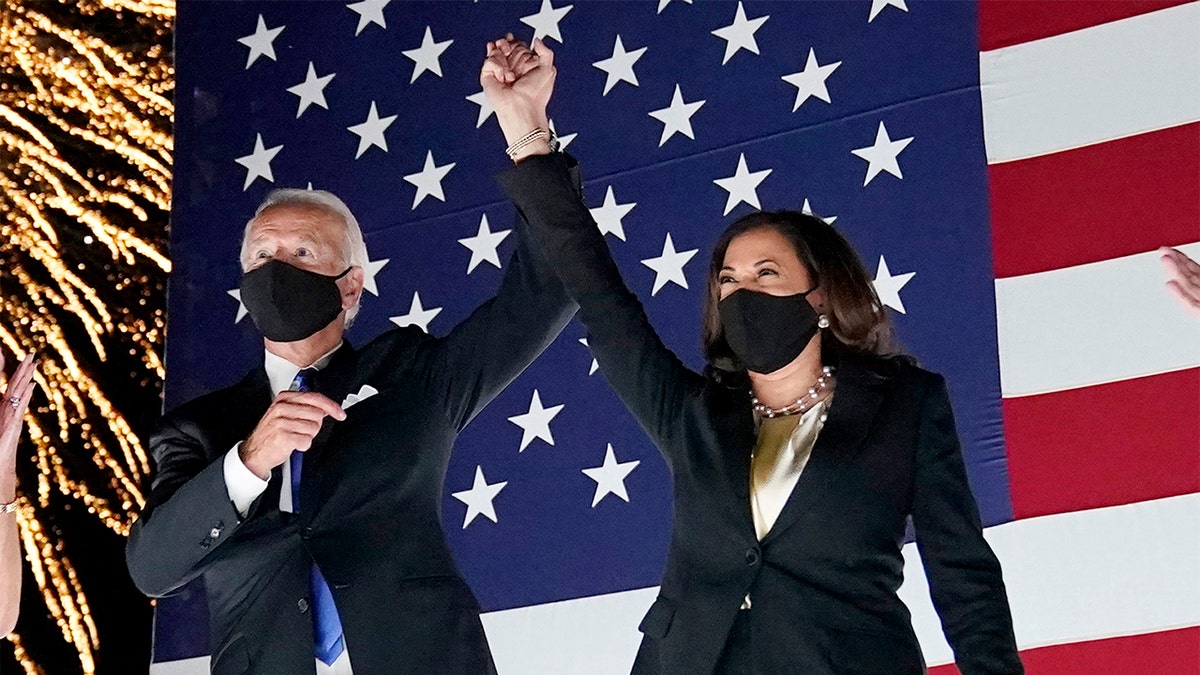
It’s been well over a month since 2020 Democratic presidential nominee Joe Biden selected Sen. Kamala Harris as his running mate and critics on both sides of the aisle are starting to wonder why she hasn’t been more accessible to the media. (AP Photo/Andrew Harnik)
Minimum Wage
Biden – along with all other Democratic candidates – has espoused a baseline $15 minimum wage.
California was the first state to approve a $15 minimum wage in 2016, to be phased in over an eight-year period. It currently stands at $13 for companies that employ 26 people or more and $12 for companies with a smaller employee count. The state will reach the minimum legal wage by 2023, CalMatters reported.
Gov. Gavin Newsom doubled-down on the policy in July, insisting that – despite the coronavirus pandemic having shuttered scores of businesses – the next hike on January 1, 2021, would still go ahead.
"Millions of low-wage workers have fled the state because of policies such as higher minimum wages and mandated benefits that make it unprofitable for companies to hire them. And the state has some of the world's highest housing costs due to artificial restrictions on housing development," contended Lawrence McQuillan, a senior fellow at the Oakland-based policy think tank, the Independent Institute. "Homelessness is out of control because low-cost housing has been eradicated, and homelessness policies have been counterproductive."
Paid Family Leave
California became the first state to establish legislation on paid family leave in 2004, offering “workers six weeks of partial pay to care for a newborn or sick family member. Workers pay for it through a 1% payroll tax that goes into the State Disability Insurance fund,” CalMatters reported.
Newsom has since broadened the program, awarding workers 8 weeks of paid family leave as of July 1.
However, only half eligible mothers and a quarter of fathers are documented to have taken the family leave, with many workers citing worries over job security and the projected struggle of only having around 60-70% of their accustomed paycheck. Last month, the California legislature made it illegal to fire an employee who chooses to take the leave.
Biden put forth a $75 billion-per-year proposal, which included three months of paid family and medical leave, funded in large part by sealing tax break loopholes for real estate investors earning in excess of $400,000 annually.
Energy
California’s energy policies appear to hold a mirror to those proposed by Biden.
"This is the state that regulates the mileage on cars and their tailpipe emissions, mandates electric trucks, cracks down on idling tankers, subsidizes rooftop solar energy, and caps statewide emissions while maintaining a marketplace where industry bids for the right to pollute," CalMatters writes.
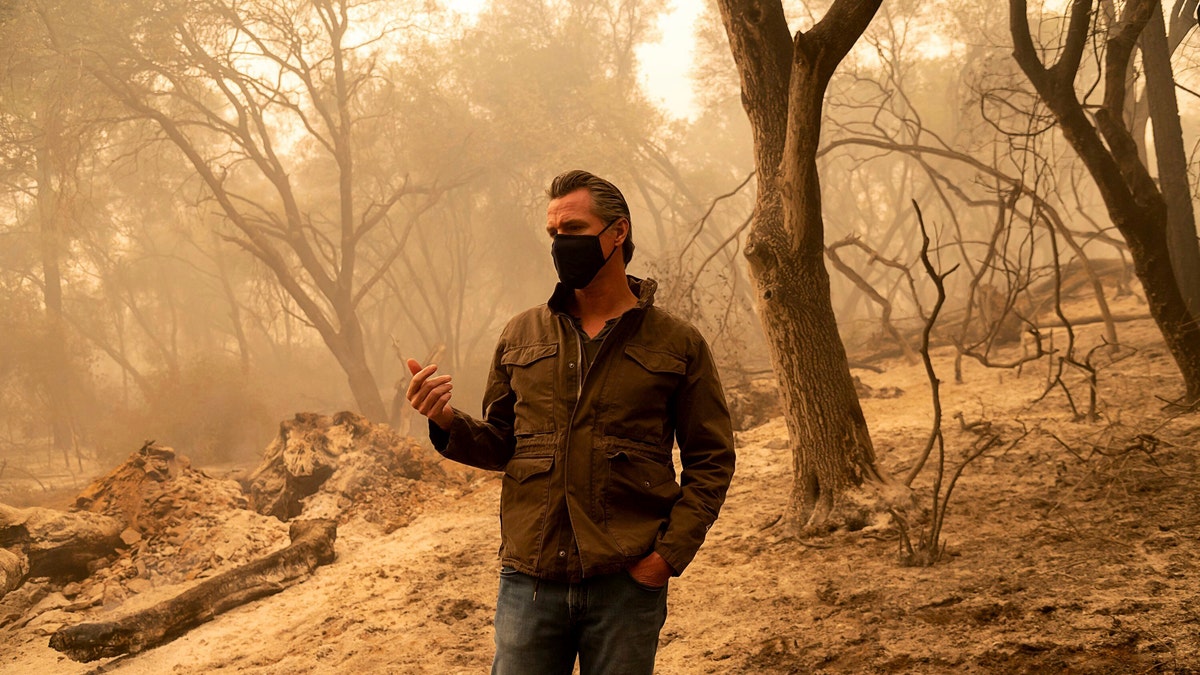
Gov. Gavin Newsom tours the North Complex Fire zone in Butte County on Friday, Sept. 11, 2020, outside of Oroville, Calif. Newsom has declared a statewide emergency due to the widespread fires and extreme weather conditions, and secured a Presidential Major Disaster Declaration to bolster the state's emergency response to the Northern California wildfires. (Paul Kitagaki Jr./The Sacramento Bee via AP, Pool)
In a similar vein, the Biden-Harris ticket entails an avowal to "go 100% greenhouse gas emission-free" through means of a $2 trillion initiative to ensure the U.S. electricity grid is entirely carbon emission-free by 2035, and making use of regulations and subsidies to "zero out net greenhouse gas emissions by 2050."
"A central tenant of the Biden energy plan is more government intervention into electricity and transportation markets. The plan would prohibit and regulate the development of other natural resources," surmised Nick Loris, an energy-focused economist at the Heritage Foundation. "Combined, these policies would harm consumers multiple times over through higher energy prices and lead to more cronyism and corporate welfare in energy markets. We see those adverse effects directly in California, where electricity rates are some of the highest in the country."
Marijuana Legalization
Biden has pledged federal support for medical marijuana use and decriminalization for recreational use, and support for the 11 states that independently have full lawful use on their books. Harris, on her own presidential campaign route, embraced pot legalization.
In California, marijuana was fully legalized in the 2016 election – thought it remains a murky matter.
Newsom stated last year that the illegal pot-growing, dispensing, and delivery industry is "getting worse, not better," and the state has failed to reap the tax revenue windfall.
Cash bail
Biden has thrown his backing behind eradicating cash bail with his campaign, calling it a “modern-day debtor’s prison.”
"The cash bail system incarcerates people who are presumed innocent," his campaign website states. "Biden will lead a national effort to end cash bail and reform our pretrial system by putting in place, instead, a system that is fair and does not inject further discrimination or bias into the process."
Two years ago, California passed legislation to cease cash bail and instead empower judges to decide whether an apprehended individual should be held or released – but voters have a chance to keep it or toss it when they head to the polls in November.
Proponents of ending the long-running measure claim it improperly favors the wealthy while hurting the poor and socially marginalized. Opponents argue that it only causes crime to spike as perpetrators are immediately allowed back out with little repercussion – citing New York's spike in violent crime as a consequence of zero bail reform mandates that came into effect in January.
Gun Control
The Biden-Harris admission has been billed as one of the most potent when it comes to potentially installing sweeping changes to gun rights, with the Democrats calling on bans to "assault weapons" and high-capacity magazines, but no specific number has been percolated.
For its part, California is considered the least gun-friendly state, overall, in the nation. It initiated its own "assault weapons" prohibition in 1989 and had continued to put in place a slew of gun restrictions in recent decades – ranging from 10-day waiting periods after purchase, outlawing high-capacity magazines, and a purchase limit of only one handgun per month.
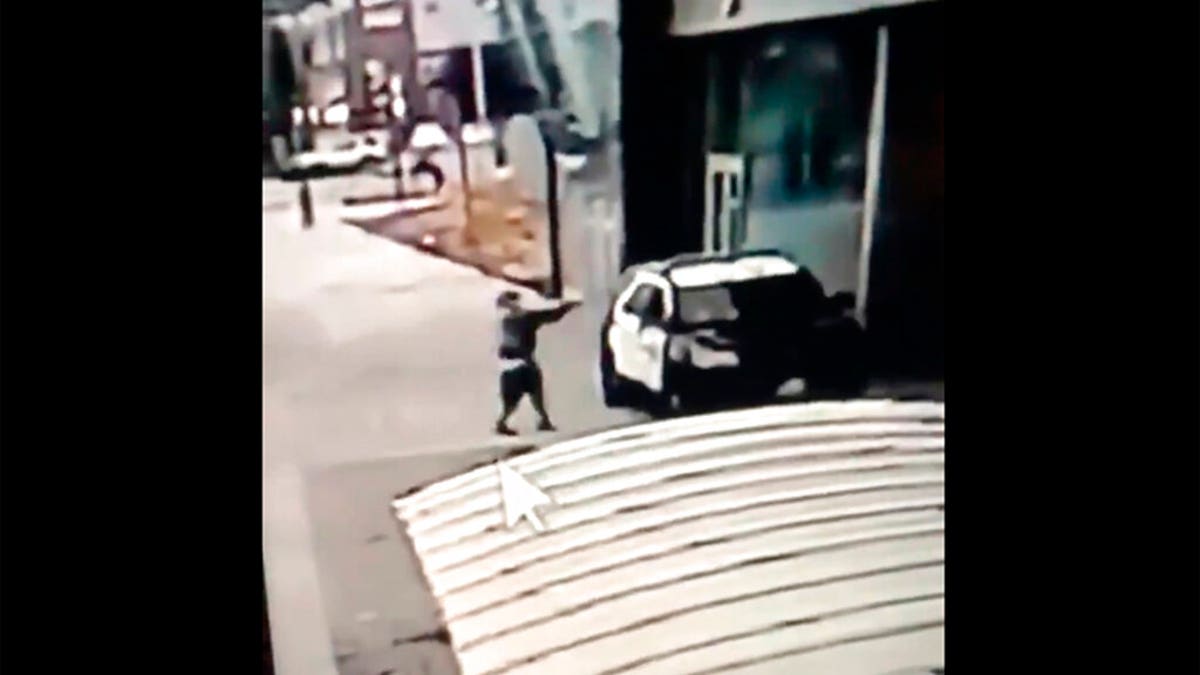
A screen grab from a security camera video released the Los Angeles County Sheriff's Department shows a gunman walking up to sheriff's deputies and opening fire without warning or provocation in Compton, Calif., on Saturday, Sept. 12, 2020. Officials say two Los Angeles County sheriff's deputies were shot in their patrol car at a Metro rail station in what appeared to be an ambush. The sheriff's department said the male and female deputies were shot in the head and had multiple gunshot wounds and were undergoing surgery. Deputies were searching for a suspect. (Los Angeles County Sheriff's Department via AP)
In addition, Biden and Harris are proponents of "red flag" laws that enable courts to temporarily take away firearms from those deemed a threat to themselves and others. California is one of 17 U.S. states with such legislation codified.
Despite the harsh laws, gun violence is a burgeoning problem. Throughout the protracted coronavirus lockdown, more than 20 mass shootings have taken place statewide, and violent crime is also accelerating. According to Los Angeles city data, as of early September, homicide was up 13.7% compared with the same time last year, while the number of shooting victims was up 8.2%.
But as CalMatters illuminates, few actually make use of the law – including police officers. A measure aimed at implementing more training for officers on how to more effectively apply the law stalled, languishing in the Legislature. With the "defund police" movement gaining momentum, the bill is unlikely to progress.
“Gig Companies”
There is a lingering question over whether ridesharing and food delivery companies like Uber, Lyft, and Doordash should be forced to classify their contractors as employees – this making an assortment of benefits available to workers.
Biden's campaign website states that he would "aggressively pursue employers who violate labor laws, participate in wage theft, or cheat on their taxes by intentionally misclassifying employees as independent contractors." Harris last year also joined the push to dramatically change California state law into reclassifying most contractors as employees.
The Golden State has proven to be one step ahead. Last year, Newsom inked a bill mandating that a number of businesses operating in the "gig economy" reassign independent contractors into formal employees,
Subsequently, something of a convoluted mess has ensued as suits are dragged through the system. Several of the Silicon Valley giants have additionally threatened to withdraw from operating in the state altogether.
Furthermore, the bill has ignited steep concern among California's creatives – writers, artists, musicians, and other independent contractors that make up the lifeblood of Hollywood – prompting Newsom to sign even more legislation this month to clarify the earlier ruling that threatened the livelihoods of millions.







